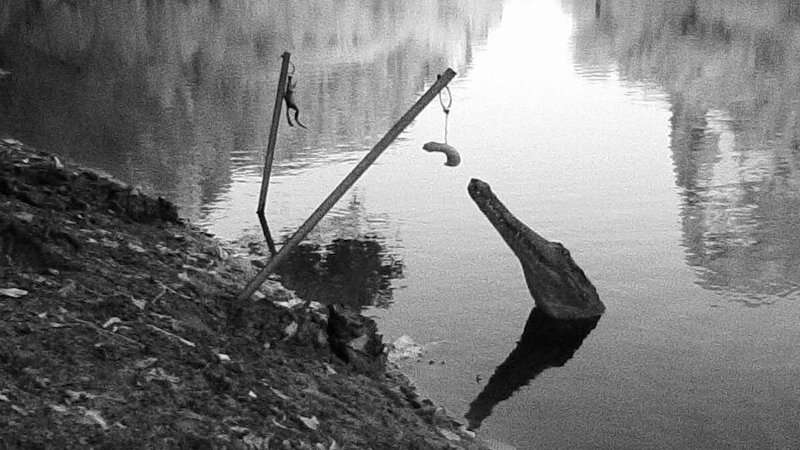This article has been reviewed according to Science X's editorial process and policies. Editors have highlighted the following attributes while ensuring the content's credibility:
fact-checked
peer-reviewed publication
trusted source
proofread
Scientists cook up a plan to save freshwater crocodiles from toxic cane toads

Scientists from Macquarie University working with Bunuba Indigenous rangers and the Department of Biodiversity, Conservation and Attractions (DBCA) in Western Australia have trialed a new way to protect freshwater crocodiles from deadly invasive cane toads spreading across northern Australia.
Freshwater crocodiles (Crocodylus johnstoni) are a culturally significant animal and part of traditional owners' Dreamtime stories in the region. The loss of these predators also upsets the delicate balance of local ecosystems.
The group's research, published in Proceedings of the Royal Society B on August 14, shows a method to significantly reduce freshwater crocodile death rates in areas where cane toads first invade by teaching the crocodiles to link cane toads with a bout of food poisoning.
Lead author Dr. Georgia Ward-Fear from Macquarie University's School of Natural Sciences and her co-author, Professor Rick Shine, documented the successful trial of a behavioral ecology method called conditioned taste aversion (CTA).
Bunuba ranger coordinator Paul Bin Busu and rangers Kristen Andrews and Karl Bin Busu reported noticeable changes in crocodile behaviors during the program.
Following the successful conservation intervention, Sara McAllister from DBCA's state cane toad program can plan future interventions in areas with similar ecology.
Trail of destruction
Since cane toads were imported from South America in the 1930s, they have left a trail of native animal casualties across northern Australia, wiping out local predator species such as goannas, snakes and freshwater crocodiles.
These animals are important foods for traditional owners and play a vital role in their environments—but have no innate defense from the poisonous toads.
"Losing freshwater crocodiles to cane toads will mean that bottom feeders in our rivers will eat all the bait such as judembah (cherrabin, a large freshwater prawn) and lardy (boney bream, an estuarine fish), leaving no fish for the barramundi and stingray to eat," says Ranger coordinator Paul Bin Busu.
The study took place mainly in May to October—the dry season in Australia's tropical north, when river systems can shrivel into a series of isolated pools, supporting far fewer of the prawns, fish and amphibians making up a freshwater crocodile's normal aquatic diet, yet higher densities of the crocodiles
"Freshwater crocs can be heavily impacted as their river systems dry out during the late dry season," says Dr. Ward-Fear. "They end up congregating in large numbers with very little food, and as toads begin to use these waterbodies for rehydration, the two come into contact and we see large numbers of crocodile deaths over a few months."
How they did it
Between 2019 and 2022, Dr. Ward-Fear and Professor Shine worked with local rangers and DBCA staff to deploy doctored cane toad carcasses across four large gorge systems in the Kimberley region of north-western Australia.
Bunuba and DBCA collected hundreds of cane toads, removing the poisonous parts and injecting the toad bodies with enough of a nausea-inducing chemical that freshwater crocodiles eating the bait would feel temporarily sick (but wouldn't die).
Control baits of chicken meat—with no nausea-inducing additives—were used to monitor the effectiveness of conditioned taste aversion training.
"Being a part of the program on the ground doing the job was really good," says Paul Bin Busu, whose team of rangers set up hundreds of bait stations over the river banks, using canoes to hang and replace fresh baits and monitor the responses of crocodiles
Getting results
"The first three days we noticed the crocodiles were taking the cane toads then they would go away.. Then we noticed they would smell the cane toad before eating, and on the last day we noticed that it was mostly the chicken necks getting eaten," he says.
Using nocturnal 'spotlighting' surveys and remotely triggered wildlife cameras to monitor crocodile and toad numbers, the team found areas where taste aversion trials took place had greatly-reduced crocodile mortality rates compared to unbaited control sites.
"Our baiting completely prevented deaths in areas where cane toads were arriving and decreased deaths by 95% in areas where toads had been for a couple of years. Effects which continued in the years following." said Dr. Ward-Fear.
"These are really exciting results because it provides land managers with tools to use ahead of the invasion, but also behind the invasion front" says Sara McAllister from DBCA. "Together we've shown that collaborations between academics, indigenous rangers and land management agencies can be really effective for conservation science"
"After the program we see that the populations of the crocodiles are coming back, which is a good thing to see," says Paul Bin Busu.
The team has previously used a similar technique, this time with less-toxic small cane toads, to protect yellow monitor lizards from the invasive predators.
Senior author Professor Rick Shine says the study details the successful use of conditioned taste aversion as a behavioral ecology technique.
"At a time when globalization has massively increased the spread of invasive species, behavioral ecology can protect vulnerable ecosystems," Professor Shine says.
More information: Taste aversion training can educate free-ranging crocodiles against toxic invaders, Proceedings of the Royal Society B: Biological Sciences (2024). DOI: 10.1098/rspb.2023.2507, royalsocietypublishing.org/doi … .1098/rspb.2023.2507
Journal information: Proceedings of the Royal Society B
Provided by Macquarie University
This content was originally published on The Macquarie University Lighthouse.





















